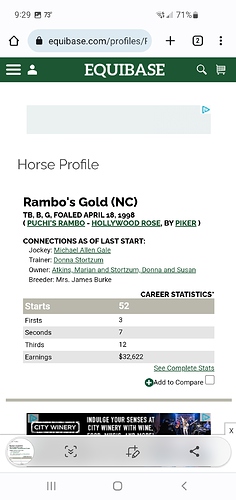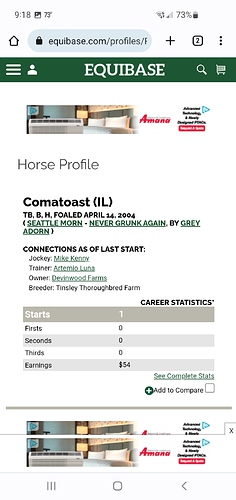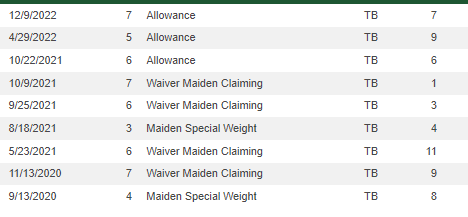I’ve had two thoroughbreds. One wasn’t really bred to run (JC Queen’s Black Tie) and I bought him as a long yearling that was barely halter trained. The second I bought in January when he turned 3 (My Man Zapper).
I started QBT myself and showed him in the hunters until he was 11. I leased then sold him to a kid at my barn. He had a lot of dumb mishaps (got kicked, got puncture wounds, etc.) that caused lameness when I had him, but was structurally sound as a show hunter from 6yo to 11yo. He’s 16 now and was recently diagnosed with a chronic soft tissue degeneration that is career limiting. I’m not totally sure if it’s from his job or from genetics or both.
MMZ ran twice in the fall as a two year old and was last or second to last. He is the calmest and sweetest non-QH I’ve ever sat on. However he has Issues. I figured out in 2020/2021 that he’s a non-recumbent sleeper (not narcoleptic) and going down the path of trying to find a vet to help me with this non-recumbent sleeping issue led me to the vet who is (very successfully) treating him now. He was never Lame, but he was kind of lame. He didn’t step under himself with his right hind. Under saddle he always gets both leads, has a sticky lead change both directions, always jumps the jump, has never bucked and is the only horse I have that I’d consider letting a beginner ride. I foxhunted him from 2018 to now very successfully. When his current treating vet went over his body on her first exam she found a very old, most likely from when he was a foal, pelvic fracture. We are treating that and he now steps under himself with the right hind and lead changes are much smoother. Still non-recumbent sleeping, but that is always very difficult to “fix”.
My point in all this is that neither horse ran much and both have Problems. I grew up riding off-track quarter horses and they were much sounder than these TBs have been. I also have a warmblood mare that I’ve owned since she was 3 months old (11yo now) and she has been very sound and shows in the hunters.
I agree with @Texarkana about checking their Equibase profiles, but actually knowing the racing connections is definitely the best way to get a sound horse. It’s just not easy to make those connections if you aren’t in the racing world.

 ) is three, so take this with a grain of salt.
) is three, so take this with a grain of salt.

 I, personally, steer clear of trained but unstarted, or super low starts. I tend to agree that there’s a reason - one that I’m likely not interested in dealing with - that they didn’t make it to the starting gate. Mostly I’m looking at current confo photos, jog video, and close-up photos of legs and feet. My risk tolerance is higher for a number of reasons, but so far the ones I haven’t PPE’d have been the most physically sound.
I, personally, steer clear of trained but unstarted, or super low starts. I tend to agree that there’s a reason - one that I’m likely not interested in dealing with - that they didn’t make it to the starting gate. Mostly I’m looking at current confo photos, jog video, and close-up photos of legs and feet. My risk tolerance is higher for a number of reasons, but so far the ones I haven’t PPE’d have been the most physically sound.